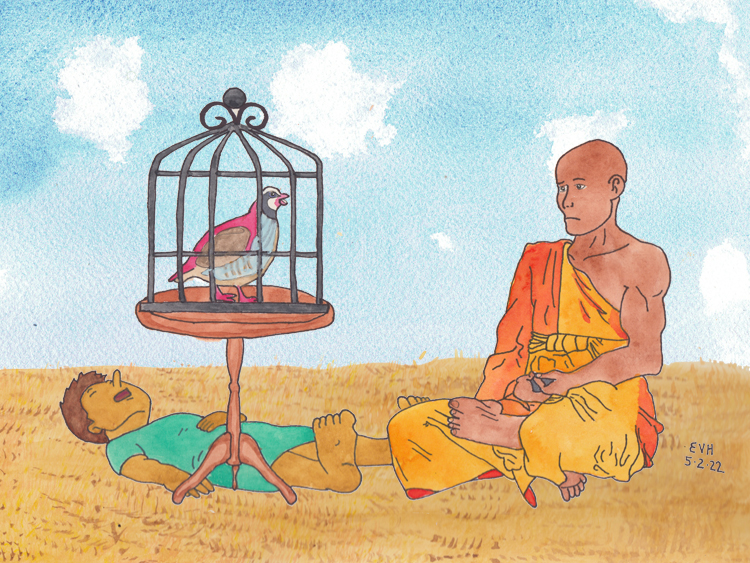
Jataka 319
Tittira Jātaka
The Partridge
as told by Eric Van Horn
originally translated by H.T. Francis and R.A. Neil, Cambridge University
originally edited by Professor Edward Byles Cowell, Cambridge University
This story poses a moral dilemma. If you are forced into an illicit act, are you to blame? Will you suffer the karmic consequences of that action? According to the story, the answer is “no.” What do you think?
“Happy life.” The Master told this story while living in the Badarika Monastery near Kosambī. It is about the elder Rāhula (the Buddha’s son). The introductory story has been already related in full in the Tipallattha Birth (Jātaka 16). The monks in the Dharma Hall were praising the venerable Rāhula and speaking of him as fond of instruction, scrupulous, and patient when rebuked. The Master came up and—on hearing from them the subject of their discussion—he said, “Not now only, but formerly also Rāhula possessed all these virtues.” And then he told them this story from the past.
Once upon a time when Brahmadatta was reigning in Benares, the Bodhisatta was reborn into a brahmin family. And when he grew up, he studied all the arts at Takkasilā University. He then gave up the world and devoted himself to the holy life in the Himalāya country. There he developed all the Faculties (1) faith/confidence, 2) energy, 3) mindfulness, 4) concentration/samadhi and 5) wisdom/insight) and Attainments (jhānas). He enjoyed the pleasures of transcendent meditation. He lived in a pleasant grove. Finally he traveled to a frontier village to procure salt and vinegar. The people, on seeing him, became believers. They built a hut for him of leaves in a wood. They provided him with all the Buddhist requisites (clothing, food, shelter, and medicine) and made a home for him there.
At this time a fowler in this village had caught a decoy partridge. He put it in a cage and carefully trained and looked after it. Then he took it to the wood, and by his cry lured all the other partridges to came. The partridge thought, “Through me many of my kinsfolk come to their deaths. This is a wicked act on my part.” So he kept quiet. When its master found he was quiet, he struck it on the head with a piece of bamboo. The partridge uttered a cry from the pain it suffered. And the fowler gained a living by attracting other partridges through it.
Then the partridge thought, “Well, suppose they die. There is no evil intention on my part. Do the evil consequences of my action affect me? When I am quiet, they do not come, but when I utter a cry, they do. And this fellow catches all those who come and puts them to death. Is there any wicked act here on my part, or is there not?” After that the only thought the partridge had was, “Who can resolve my doubt?” and he went about seeking a wise man.
Now one day the fowler snared a lot of partridges. He filled his basket with them and then came upon the Bodhisatta’s hermitage. There he asked for a drink of water. He put down the cage near the Bodhisatta. He drank some water and lay down on the sand and fell asleep. The partridge—seeing that he was asleep—thought, “I will ask this recluse about my doubt, and if he knows he will solve my dilemma.” And as he lay in his cage, he repeated the first stanza in the form of a question:
Happy life I lead all day,
Food abundant falls to me,
Yet I’m in a frightful way,
What’s my future state to be?

Figure: “What’s my future state to be?”
The Bodhisatta—solving this question—uttered the second stanza:
If no evil in your heart
Prompts the deed of villainy,
Should you play a passive part,
Guilt attaches not to thee.
The partridge on hearing this uttered the third stanza:
“Lo! our kinsman,” thus they cry,
And in crowds they flock to see.
Am I guilty, should they die?
Please resolve this doubt for me.
On hearing this, the Bodhisatta repeated the fourth stanza:
If no ill lurks in the heart,
Innocent the deed will be.
He who plays a passive part
From all guilt is counted free.
Thus did the Great Being console the partridge. And through him the bird was freed from remorse. Then the fowler woke up, saluted the Bodhisatta, and took up his cage and made off.
The Master, having ended his lesson, identified the birth: “At that time Rāhula was the partridge, and I was the recluse.”
